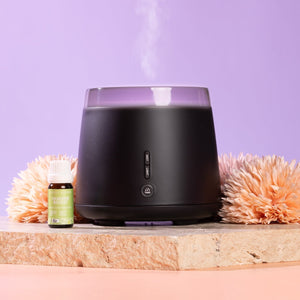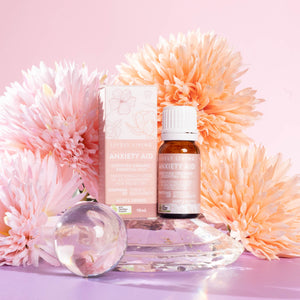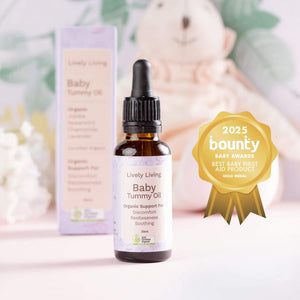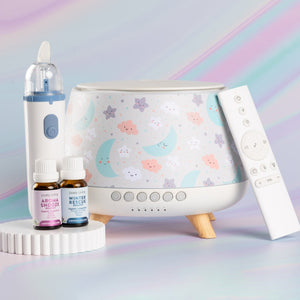Soothing Your Baby: Essential Oils for Teething Relief
Teething is a natural process that all babies go through, but that doesn’t make it any easier on them – or you. As their tiny teeth start pushing through, your little one might experience discomfort, fussiness, and sleepless nights. While there are many ways to soothe a teething baby, many parents are turning to natural solutions, such as essential oils for teething. This exploration delves into how to safely use essential oils, the benefits and risks, and answers frequently asked questions about incorporating them into your baby's teething routine.
Table Of Contents:
- Understanding the Basics: Essential Oils for Teething
- Other Natural Teething Remedies
- FAQs about essential oils for teething
- Conclusion
Understanding the Basics: Essential Oils for Teething
Essential oils are potent, aromatic compounds derived from various parts of plants like flowers, leaves, and roots. People use essential oils in aromatherapy, a holistic approach using scents to enhance well-being.
While not a cure, certain essential oils like chamomile and lavender are believed to possess calming and soothing properties. These are often used to potentially alleviate common teething discomforts in babies. It is important to note that using essential oils for teething babies can provide calming effects due to their nontoxic nature.
Choosing the Right Essential Oils
Not all essential oils are appropriate for babies or young children. When considering essential oils for teething, it's vital to choose those known for their gentle nature and suitability for infants.
Some of the most commonly recommended essential oils for teething babies include:
- Lavender: Known for its calming and relaxing effects, lavender oil might help to ease discomfort and promote sleep.
- Roman Chamomile: This oil may offer anti-inflammatory and analgesic benefits, potentially helping soothe inflamed gums.
- German Chamomile: A gentle oil that could be helpful during teething as some people find it provides a calming and soothing effect.
- Child Calming Remedy: Lively Living Certified Organic Child Calming Remedy combines soothng Lavender and Roman Chamomile and Orange oil and is the perfect essential oil to use with fractionated Coconut oil

Safe Practices and Application Methods
Before using any essential oil, even diluted, on your baby’s skin, it's a good idea to do a patch test on a small area, like their forearm. If there's no reaction after 24 hours, it's generally considered safe.
Here are some additional precautions:
- Always dilute: Essential oils are very concentrated and should always be diluted with a carrier oil.
- Consult a healthcare provider: Speak to your doctor, pediatrician, or other qualified health practitioners. Every baby is different, and it's best to receive personalized advice tailored to your child’s age and health. Medical conditions should always be considered before using essential oils for teething.
- Less is more: Start with a small amount of diluted essential oil and monitor your baby’s reaction. Make sure you are applying therapeutic oils safely to alleviate pain.
- Avoid direct application: For young babies, avoid applying essential oils directly to the gums or mouth.
- Storage: Keep essential oils stored properly, out of reach of children and pets, and away from direct sunlight and heat.
Other Natural Teething Remedies
You have a world of options for teething solutions, so you are not just limited to essential oils for teething. Alongside essential oils, many other natural teething remedies can help soothe a fussy baby:
- Cold objects: Like a chilled teething ring or a cold, wet washcloth can numb gums and provide relief. The Mayo Clinic says this can be very effective.
- Gentle pressure: Softly rubbing your baby's gums with a clean finger can alleviate discomfort.
- Amber teething necklaces: While the effectiveness of amber teething necklaces is debated, some parents report seeing some benefit.
- Breastfeeding or formula: Extra feeding sessions can offer comfort and security to a teething baby.
- Frozen foods (for older babies): Once your baby starts on solids, offering frozen purees or chilled fruits and veggies in a mesh feeder can help numb their gums. Just remember to cut these into small pieces to prevent choking.

FAQs about essential oils for teething
What essential oils are safe for teething babies?
Not all essential oils are considered safe for use with babies and toddlers due to their potency. Gentle options considered suitable for teething often include Roman Chamomile, Lavender, and German Chamomile. Before use, a healthcare provider should be consulted. Diluting properly is essential, starting with a lower concentration for babies younger than six months.
What is the best natural remedy for baby teething pain?
Opinions vary, but cold objects, amber teething necklaces, and applying gentle pressure are often touted as the top contenders for natural remedies, according to this article in Natural News. Cold temperatures can numb gums; some believe amber necklaces contain succinic acid that provides relief and the pressure can feel soothing to inflamed gums. As always, every baby responds differently to teething remedies. Consider these remedies in addition to using essential oil blends.
What essential oils are good for tooth problems?
While they shouldn’t be considered a replacement for proper dental care, essential oils like clove bud (clove oil) and tea tree oil are commonly cited for their potential antimicrobial and pain-relieving qualities. This is according to Healthline, but keep in mind this research applies to those two years of age or older. Clove bud is known for its numbing abilities, and tea tree oil may have antibacterial characteristics that could address gum infections. It's crucial to dilute any essential oil with a carrier oil before use. Dilute clove bud oil carefully, as it's a powerful analgesic often used in dental preparations for its numbing effect.
How do you make teething oil?
Crafting your own teething oil starts by choosing baby-safe essential oils like lavender, roman chamomile, or oils from Lively Living Baby Range. Remember to dilute it properly. The standard guideline is typically one to two drops of essential oil for every 10ml of a carrier oil. Popular carrier oil options include coconut oil and almond oil because they are generally considered gentle on the skin. Thoroughly combine the oils in a roller bottle or a small container. It is important to remember though to perform a patch test on a small area of your baby's skin before widespread use. As always, consulting with a medical expert, like your pediatrician or a qualified aromatherapist, is essential for ensuring safe practices tailored to your little one's needs.
Conclusion
Teething can be a challenging time for babies and parents alike, but exploring essential oils for teething relief is one natural approach to consider. Always remember safety, appropriate dilution, and consulting a qualified healthcare professional before using them for infants and children. With some understanding and a cautious approach, you can use natural solutions to provide comfort to your baby and enjoy these developmental milestones.




















